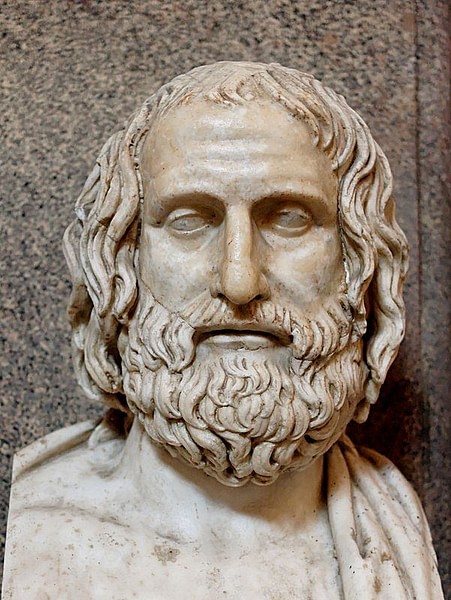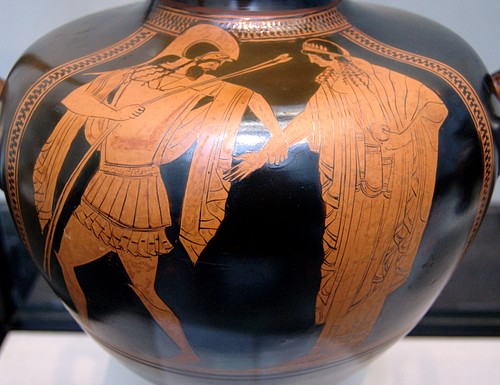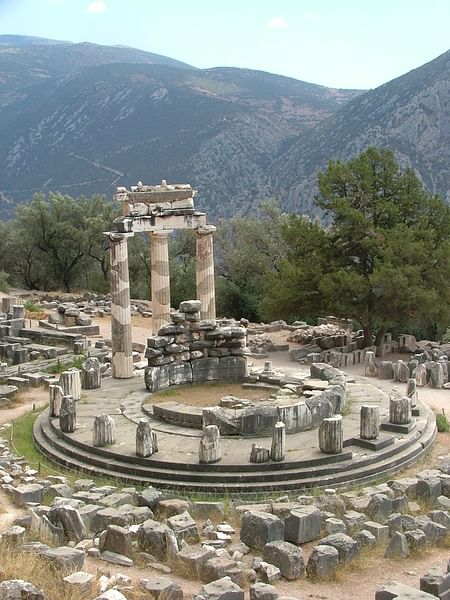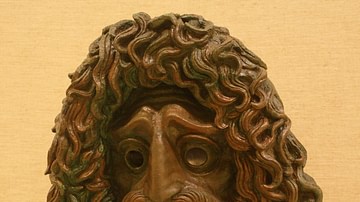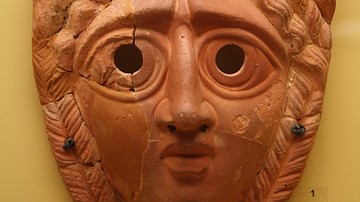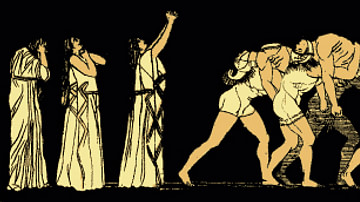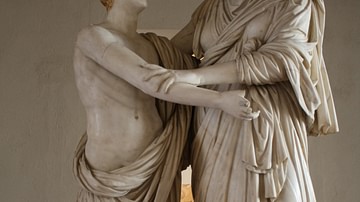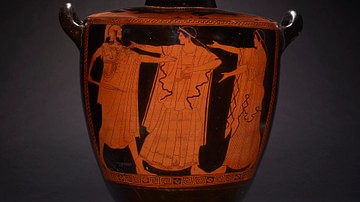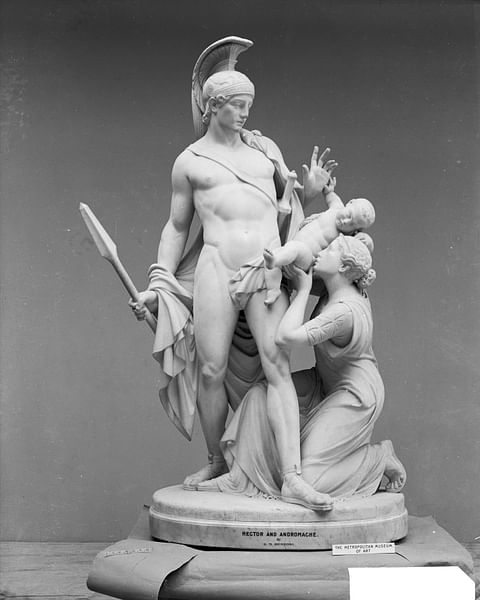
Andromache is a Greek tragedy written by Euripides (c. 484-407 BCE), one of only 19 plays (out of 92) to survive. The play is actually in two parts, and like Sophocles' Women of Trachis, it has no central character.
The first part of the play deals with the plight of Andromache. Now the slave of Neoptolemus, the former wife of the Trojan prince Hector, she is threatened by Hermione, the young wife of her master. Together with her father, King Menelaus of Sparta, she threatens to kill Andromache and her young son. Luckily, she and her son are saved by King Peleus, father of Achilles and grandfather of Neoptolemus.
The second part is concerned with Hermione - the daughter of Menelaus and Helen - who fears the return of her husband from Delphi. He will most certainly kill her when he hears of her plan. Miraculously, Orestes, son of Agamemnon, arrives and saves the day with plans to kill her husband. The play ends with King Peleus, although grieving for his dead grandson, promised immortality by the goddess Thetis.
Euripides
Little is known of Euripides' early life. He was born in the 480s BCE on the island of Salamis near Athens to a family of hereditary priests. While he preferred a life of solitude, alone with his books, he was married to Melito and had three sons, one of whom became a noted playwright. It is suspected that the son may have completed Iphigenia in Aulis after his father's death. Unlike his contemporary Sophocles, Euripides played little or no part in Athenian political affairs; the one exception was a brief diplomatic mission to Sicily. The poet made his debut at the Dionysia festival in 455 BCE, performing over 22 times over the years, winning his first victory in 441 BCE. Unfortunately, his participation in these competitions did not prove to be very successful with only four victories; a fifth came after his death for Iphigenia in Aulis. In contrast, Sophocles won over 24 times.
The Greek philosopher Aristotle called Euripides the most tragic of the Greek poets. Classicist Edith Hamilton in her book The Greek Way agreed when she wrote that he was the saddest of the poets, a poet of the world's grief. “He feels, as no other writer has felt, the pitifulness of human life, as of children suffering helplessly what they do not know and can never understand.” (205) With the Peloponnesian War waging, he left Athens in 408 BCE at the request of King Archelaus to live the remainder of his life in Macedonia. Although often misunderstood during his lifetime and never receiving the acclaim he deserved, he became one of the most admired poets long after his death, influencing not only Greek theatre but Roman literature. Children would learn language and grammar from both Homer and Euripides.
Cast of Characters
- Andromache
- Servant woman
- Chorus of Pythian women
- Hermione
- King Menelaus
- Child
- King Peleus
- Nurse
- Orestes
- Messenger
- Thetis
The Play
The play begins outside the palace of Neoptolemus. Andromache sits at the altar of the sea goddess Thetis, mother of Achilles. As she sits she reflects on the tragedy of her life: the death of her beloved husband Hector at the hands of Achilles, the cruel death of her infant son Astyanax, and lastly, her arrival in Thessaly as a slave.
From a house born free I came to Greece a slave, given to Achilles' son, the islander Neoptolemus, to be his spear's reward a choice selection from the Trojan loot. (18)
It was here that she bore her new master a son; however, because of this, she is now in danger.
But since my master married Hermione the Spartan, and rejected my slave bed, I am driven by her evil cruelties. She says that by the use of secret drugs I make her childless, hateful to her husband, that I wish to occupy this house myself in her place. (18)
Now the young wife wants to kill her. Fearing for her life and that of her son, she has sent him away. Unfortunately, Hermione has been joined by her father, King Menelaus of Sparta. Since her husband is away at the altar of Apollo at Delphi “to ask amends for the death of his father,” she is free to do as she wants. Andromache sits at the altar of Thetis knowing that Hermione, and now her father, wants to kill her. A servant, loyal to Andromache, brings news of Menelaus' and Hermione's true plans.
It's your son they mean to kill, unhappy woman, whom you sent away in secret out of the house. Menelaus has left the house and gone to get him. (19)
Desperate, Andromache asks the servant to take a message to King Peleus, father of Achilles and grandfather of Neoptolemus. As she leaves the chorus enters to give comfort to the fallen Trojan woman. As they speak Hermione exits the palace and approaches the women. She immediately insults Andromache, calling her a wretched creature and a barbarian.
You are a slave, a woman won by the spear, who wants to keep this house and throw me out. Your drugs have made me hateful to my husband, and because of you my ruined womb is barren. ... So if some mortal or god is willing to save you, you must let go your former prosperous pride to cower in humility, fall at my knees. (23)
Andromache does not back down from Hermione's verbal assault.
…It's not my drugs that make your husband hate you: you have turned out to be unfit to live with. This is the love charm, woman, it isn't beauty, but goodness that gives pleasure to our husbands. (24)
Hermione responds that although Andromache might be wise she still must die. As the statue of Thetis "stares" down at them, Hermione tells the fallen Trojan that Thetis hates Troy because of Achilles' death, but Andromache responds that it was Helen, Hermione's mother, who killed Achilles. She adds that she will not leave the altar if it means death. "Slaughter me, bloody the altar, the goddess will punish." (27) Menelaus arrives, carrying Andromache's son.
And if you don't get out and abandon this shrine this child here will be slaughtered in your place. (29)
Andromache cries aloud. Will Neoptolemus tolerate the killing of her son? She asks for mercy, saying she will take what punishment they give. Menelaus dismisses her plea.
Well, get up and leave this temple of the goddess, since, if you don't want to die, then I will kill him. One of the pair of you must leave this life. (31)
Andromache finally concedes and agrees to leave the altar to save her child. But Menelaus betrays her and orders her hands tied behind her back. He will give the child to his daughter to be killed if she so wishes it. The child pleads that he not be killed, but Menelaus shows no mercy. As they speak King Peleus enters and confronts Menelaus and Hermione. He addresses Andromache:
You're being killed here like a ewe with her lamb while I am absent and your master too. (38)
She tells him of her plight and begs him to rescue them. Peleus orders a servant to untie them. Menelaus and Peleus argue. The Spartan king says: "You will never take the woman from my hands" (39). Peleus responds, calling him a coward and a child of cowards. He reminds Menelaus of the victory at Troy – although Menelaus returned home untouched – and then adds that he told his grandson not to marry Hermione in the first place.
… you come to my son's house, to plunder it in his absence and to kill an unhappy woman - shamelessly - and a boy who will make you suffer for what you've done … (40)
He tells the young child to undo his mother's restraints. He then tells Menelaus to leave and take his daughter – "barren heifer" that she is. Menelaus realizes that he has lost and tells of his plans to return to Sparta but promises to return and face his son-in-law, and if need be, he and Peleus will meet again. Peleus, Andromache, and the child leave. Hermione's nurse exits the palace.
Dearest woman how evil follows evil today, one thing right after the other. So now my mistress in the house, Hermione, deserted by her father, and aware of what she has done – wishes to die. (46)
She is afraid of her husband; her desire to kill Andromache may have led to her "dismissal and disgrace." She is afraid of what her husband will do when he returns from Delphi, especially since Menelaus has abandoned her and returned home. As she laments her plight, Orestes appears. He identifies himself as the son of Agamemnon and Clytemnestra. Hermione kneels before him and asks his pity. She slowly explains to him that her husband Neoptolemus had Andromache, Hector's wife, as a concubine. Since her husband loves another, she and her father Menelaus plotted to kill her and her son. Now she fears her husband. If he leaves the oracle at Delphi and returns home, he will surely kill her. Orestes responds that he already knew of her problem and had a personal reason to hate Menelaus. He tells her that years earlier he had been promised her hand in marriage, but Menelaus had reneged on the promise and married her to Achilles' son. Orestes promises to return her safely to her father, for he already had a plan in place to kill Neoptolemus.
After the three leave, King Peleus returns and asks of Hermione's whereabouts. The chorus leader responds that Hermione was gone with Orestes. He is told that Orestes had arranged the murder of Neoptolemus at Apollo's oracle. As they talk a messenger arrives and tells them of the death of the king's grandson. Peleus is shaken. Shortly, a funeral procession appears, carrying the body of Peleus' grandson. As Peleus grieves, the goddess Thetis (mother of Achilles and grandmother of Neoptolemus) appears in the sky above him. She tells Peleus not to grieve because Andromache's descendants will one day rule Molossia. As for him, she will free him of the troubles that mortals endure for he will join her in immortality, a god beside a goddess. Peleus promises to end his grief and joins the procession as they leave.
Conclusion
As with most of the plays written during this time, the audience was well aware of the myth concerning Andromache and her life after the Trojan War. She had been the wife of Hector, son of King Priam and brother of Paris, and mother of the infant Astyanax. She had watched from Priam's Tower as Achilles killed her husband. Later, she saw her young, infant son brutally murdered. Now, she was in Thessaly, slave to the son of her husband's murderer, Neoptolemus. There was little or no love in her heart for anyone in this new land except for her young son (her child by Neoptolemus).
Little is known about Hermione outside Euripides' play, causing her to be referred by some as a "shadowy character." Unlike King Peleus, Menelaus is shown to be cold and arrogant: how can one show sympathy for someone who wants to kill a small child? His negative portrayal of the Spartan king demonstrates the attitude many Athenians had towards Sparta.
